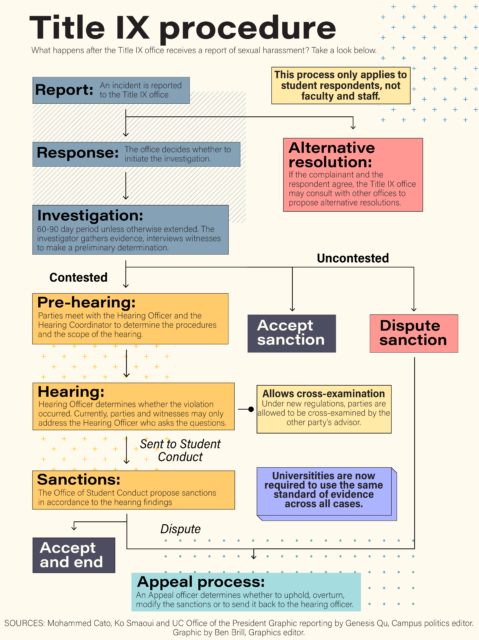This post was updated Sept. 11 at 11:34 p.m. to reflect clarified information in the graphic.
Student advocates are calling on UCLA to protect those who have experienced sexual violence in light of May Title IX regulations from the federal government.
The Department of Education released new rules in May to regulate how higher education institutions process Title IX cases. These rules would allow the cross-examination of both parties at a live hearing.
The new rules, which went into effect Friday, also restrict Title IX offices’ jurisdictions to cases in which alleged violations occurred at a university education program in the United States, on university-owned property or places where it has substantial control, said Christina Read, the Undergraduate Students Association Council student wellness commissioner.
Laura Knittig, a recent UCLA graduate and founder of SAVE Research, an organization promoting sexual assault awareness, said this change would largely exclude Greek life from Title IX offices’ jurisdiction, as private apartments and fraternity houses do not fall into it.
Title IX offices would not cover any incidents that happened off-campus, which includes the fraternity houses and apartments where graduate students live, said Sara Wilf, a social welfare doctoral student at the UCLA Luskin School of Public Affairs.
The DOE will now require all universities to apply either the preponderance of evidence standard or clear and convincing evidence standard to all Title IX investigations. The preponderance of evidence standard requires evidence that it is more likely than not that the violation occurred, while the more stringent clear and convincing evidence standard requires proof that the violation to have occurred to a higher level of certainty, Knittig said.
The new rules aim to protect those accused of sexual misconduct from unjust prosecution, said Secretary of Education Betsy DeVos in a May press release.
However, this shift in priorities comes at the expense of the complainant, Wilf said.
“The new Title IX changes are intended to discourage, disempower, and silence survivors of sexual violence by making an already complex and lengthy reporting process even more difficult,” Wilf said in a press release.
The regulations give universities discretion over how they implement the new DOE regulations, Wilf said.
Wilf is one of several students who started a petition online calling on UCLA to commit to protect UCLA students despite these new rules and to issue a public statement affirming its commitment to students who have experienced sexual violence. The petition has gathered more than 1,100 signatures as of Saturday.
“The administration has taken no concrete steps to explain how it will navigate the new Title IX rules while reducing harm for survivors and ensuring all students’ safety,” Wilf said in the press release.
Mohammed Cato, the UCLA Title IX director, said in an emailed statement that UCLA will address sexual misconduct beyond the scope set by the DOE.
Cato said in the statement that the UCLA Title IX Office may be able to investigate misconduct that occurs off-campus, depending on the nature of the allegation.
UCLA will continue to use the preponderance of evidence standard for its Title IX investigations as well as for other university offices that conduct investigations, he added.
Cato said in the statement that UCLA will continue to provide live hearings over Zoom or other similar platforms for Title IX cases. Both parties’ advisors will be allowed to examine witnesses and parties after the hearing officer approves their questions, Cato said. He added that if a party does not have an advisor to ask questions on their behalf, the university will provide an individual instead.
Knittig, who said she was a complainant of a Title IX case at UCLA, said the new DOE regulations fail to make both parties feel safe and comfortable, discouraging those who have experienced sexual assault from speaking up.
“I understand how traumatizing this process can be for those affected by sexual violence or assault,” Knittig said. “These changes will impede victim-survivors’ healing process by forcing them to engage with their assailant. We need to hold UCLA and the Title IX Office accountable to advocate for its students on the grounds of equity and equality.”

